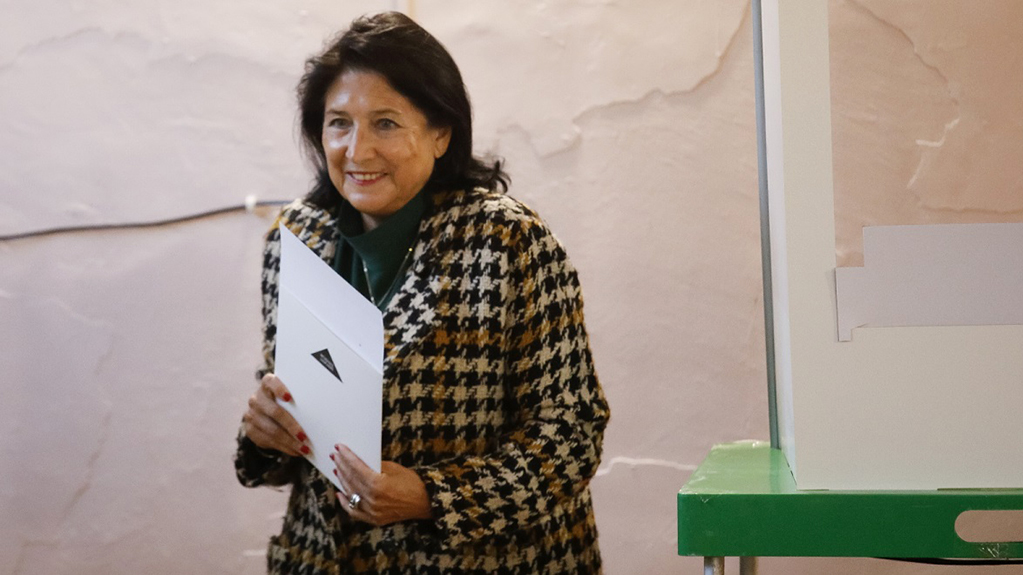The Constitutional Court of Georgia has registered a lawsuit filed by President Salome Zourabichvili, seeking the annulment of the final results of the parliamentary elections held on October 26.
News
Trending stories
- 1 BBC investigation: WWI–Era Chemical Weapons Used to Disperse Tbilisi Protests
- 2 Starting in 2026, First-Year Students at Private Universities Will No Longer Receive State Grants
- 3 NGOs Demand Answers on Which Chemical Substances MIA Used Against Protesters
- 4 Zurabishvili Appeals to International Organisations to Investigate Possible Use of “Camite”
- 5 Kobakhidze and Putin Attend International Forum on Neutrality in Turkmenistan
- 6 The Strasbourg Court Has Begun the Substantive Hearing of Gela Mtivlishvili's Case
The President is appealing specific articles of the Election Code, along with resolutions and decrees issued by the Central Election Commission (CEC).
The lawsuit claims that the CEC failed to equip polling stations in a manner that ensured the secrecy of voting, thereby violating electoral principles at all electronic polling stations where electronic ballots were used.
According to the constitutional lawsuit, violations of voting secrecy were identified during the October 26 elections. An analysis revealed these violations were so widespread that they constituted a massive breach of the fundamental principle of voting secrecy.
"This was evident in the fact that the recorded vote was visible on the back of the ballot. Notably, even the frame-envelope failed to protect voter privacy. This issue arose, on the one hand, due to the size of the frame-envelope, and on the other hand, because the back of the ballot became partially visible as it was inserted into the vote-counting machine, even when the rules for placing the ballot, as explained by commission members, were followed.
Additionally, as soon as election precincts opened, video cameras were extensively installed. These cameras were positioned in some cases to view the registrar's desks and verification machines, and in other cases, to capture the voting booths and main ballot boxes.
The design of the approved ballot and the markers used for the October 26, 2024, elections also failed to ensure voting secrecy. Specifically, the circles marked with the provided marker were clearly visible through the thin material of the ballot when it was inserted into the vote-counting machine. Furthermore, the presence of video cameras at nearly all polling stations, which recorded the voting process continuously throughout the day, created a perception of surveillance, making voters feel that the election was not free from pressure.
The scale of this issue is underscored by the fact that electronic voting was conducted at 2263 polling stations, accounting for approximately 90% of registered voters. Since the secrecy of voting in these stations was fundamentally compromised, it had a widespread and decisive impact on the principle of free voter expression and, consequently, on the election results," the lawsuit states.
In addition to challenging absentee voting, the President also disputes the violation of the principle of electoral universality. According to the lawsuit, approximately 96 000 voters were registered abroad, but about two-thirds of them (over 60 000) were unable to participate in the elections, despite reports of high voter turnout in specific precincts abroad.
"The total number of voters was approximately 2 million (2 111 834, according to the contested CEC summary protocol). The exclusion of those on the electoral roll who were unable to vote accounted for about 3% of the total number of participating voters. This, combined with the breach of voting secrecy, had a significant impact on the election results," the claimant argues.
The lawsuit further notes that during the election period, over 270 000 voters were outside Georgia. A majority of these voters were disenfranchised before election day because the CEC failed to establish adequate safeguards for their right to vote, did not open a sufficient number of polling stations proportional to their locations, and did not provide voters with proper registration opportunities at accessible polling stations.
Following the registration of the lawsuit, the plenum of the Constitutional Court must decide whether to accept the case for consideration on its merits.















